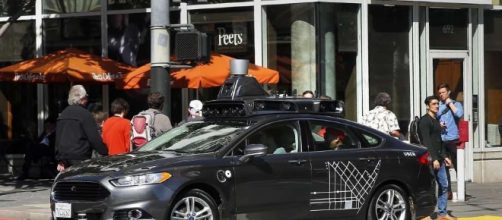The San Francisco Chronicle is reporting that California state regulators are considering rules that will permit actual self-driving cars to operate in that states streets and highways. The development stems from increasing confidence on the behalf of engineers that not having a human driver ready at all times to take over the wheel will be safe for passengers. Hitherto, California has required a driver to be present in an autonomous vehicle.
Such a measure could mean the deployment of vehicles that do not have a steering wheel, brake, or accelerator pedal.
Passengers would be able to direct where the car is to go and then relax, conducting some other past time such as working on a laptop, reading, watching videos, or even taking a nap. Such technology could fundamentally change how we view automobiles, changing them from a personal conveyance to just another transportation option, ending or making rare the Private Ownership of cars.
The idea is that instead of owning a car that sits in the driveway most of the time, costing insurance, maintenance, and monthly payments, the commuter of the future will just summon a car much as some people do a ride-sharing vehicle such as Uber and order it to take him or her to a destination.
On the benefit side of the ledger, self-driving cars will be safer to ride in.
They will not be subject to road rage or drunk and distracted driving. They would obey the traffic laws. Automobile accidents would plummet. People who, due to age or infirmary, are not permitted to drive will now have improved transportation options.
On the other side of the ledger, Autonomous Vehicles would destroy numerous jobs from taxi drivers to traffic cops. Some jobs would be created in the form of remote control monitors who can take over if a self-driving car gets into trouble or has a navigation glitch.
However, self-driving cars would be subject to hacking, unless carefully designed to ward off such cyber attacks.
The main impediment to a future where autonomous vehicles dominate the roads is public acceptance. Marketing surveys have shown a reticence to give up control of a motor vehicle, even if it is, on balance, safer.

